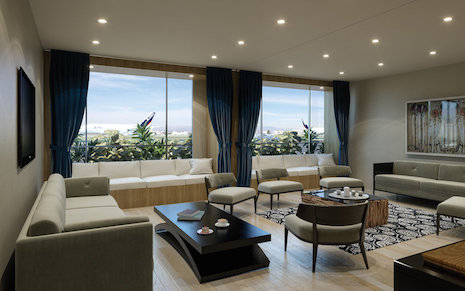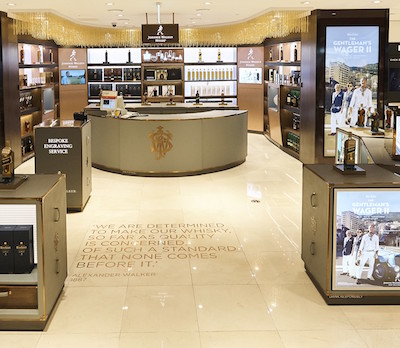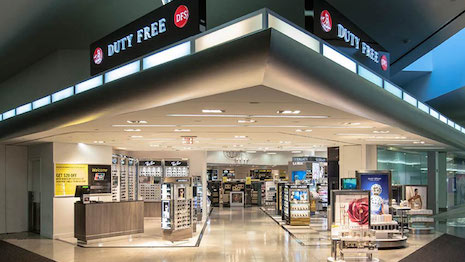Retail in relation to travel is a significant source of revenue with global duty-free shopping projected to increase 27 percent by 2021, according to a new report from GlobalData.
GlobalData's latest research found that shopping within airports hit a global spend of $38 billion last year and is on track for $49 billion by 2021. Travelers are now getting to the airport earlier to ensure passing through security on time, which is increasingly becoming more complicated, leading to more spare time to shop before flights.
“Apart from the growing number of air travelers, increased security over recent years delivers a constantly changing captive audience for airside retailers, which claim 83 percent of all spending in airports," said Maureen Hinton, group research director at Global Data Retail. "This audience has time to kill and, especially when on holiday, is in the mood to spend.”
Airport shopping
Many airports are undergoing transformations, causing then to resemble leisure destinations instead of standard terminals. Consumers are finding themselves shopping and spending money inside the airport more than in the past.
Representative of this, the United States, not known for amenities in airports, has been seeing a lot of growth in terms of renovation and luxuries.
For instance, Los Angeles International Airport, better known as LAX, is joining a growing list of airports catering to wealthy travelers with the addition of an exclusive terminal for VIPs.
The new terminal is called The Private Suite and comes with a host of features exclusive for affluent fliers. LAX is now in the company of airports in London, Dubai, United Arab Emirates and other countries that cater to luxury travelers (see more).

A private suite in LAX's new VIP lounge
However, this type of innovation can be stalled now that many travelers are opting out of visiting the U.S. after President Trump's strong stance on immigration.
Travel heavy regions
China is causing a significant boon to the Asian retail market, with many of its citizens traveling and spending money in other Asian countries. This has caused Asia-Pacific airports to garner the most revenue from spending in 2016.
The region secured $14.8 billion last year. Chinese consumers were drawn to the duty-free luxury goods.
Brexit was cause for an increase in travel to England after the pound dropped in value and travel to the country was less expensive. The country came second behind Asia-Pacific in terms of seeing the most spend with $10.7 billion.

Johnnie Walker House in Incheon International Airport
London has remained the world’s top city in a time when place equity matters more than ever throughout Brexit.
Resonance’s “World’s Best City Brands 2017” report explored 100 cities, judging each locale on six categories to measure the perceived appeal of a place for residents, visitors and investors.
As more and more content, commerce and communication shifts to the online space, sense of place and how individuals tap into the energy and excitement of a location will become intertwined with prosperity (see more).
"Airports appreciate the extra revenue and are willing to invest in creating a more inviting space for travelers," Ms. Hinton said. "For example, in Singapore’s Changi airport you can catch a movie, browse new art, play games, pamper yourself in a spa and entertain your kids – the airport equivalent of a modern shopping center.”
{"ct":"NO6iJcg2EeEkgvebp4Ry\/o0ROpfjqOR45pG08mKZKGzWsAluf5kwhP4BCqecyqJnDpkWI1bI6+Ip3h3BUWNYg4ZA6gu\/1SLrZ51zvkZoHoYqIIwa9UqJd0xjHwjYjxk1NIBu9Ykp8pO59g7otZUfyfWudQ0+jwTTnxELGwIphOkYd86Ie1xi76Ueke2jC6l6c7Z5adkUtUEgRXfOhUaCEX4xS9Is9Zx5JreMsi79X3riNvlRt+OOSKHLqlFHaLuATFesTllpYf\/v5MNxzzwKCNFcbMtCjLc6czYYb\/lcx62r1fnX8es7BWyYDMFY6GVVRR\/rUXPP3Pp5mtDsLCP4JlLDZl90ksfbmT0s8TPrgVBFZkanf1CEenbamV9FQfwP+B5fQwz\/wj5uXKcfPncRk7cUQPVBoW3QQYdX7gnVl6KuetFH4AVo3+nvOSAG3e5\/P4UyKKdUQUa0o+iMx0iY\/m8V2Veqf0OTrgHbRsmF662RPR7Imf1Z18Y6Ey5+iNA3o3sC\/CLAIeYgtN8g5L50q2tL25zHDKu2YvAe6yzdkNwYbaqVKrVBH9x7h7n3f5MlrdBIfFr044MLGn28jm0Sp4oNVWKBcRN+su+F0KX0iGX+eS2mUXwy2lzdCzn4JXJCBevZuRMiAv+C3I6bZHVKr2aZO6yMDoMWQ4wKND8JHWsHZDG\/\/0ScnXgNacV1CJIgQtxSu1ADP6ZctKlZZzIZAOMhk+MgabsZv\/kSf7vIbTe85VlqT\/4KHJa7aBxinEqRfgV4nYpfo73beHlGzonqGmby5xuuTswoZoAZeVUlYKwiRcNBvam5MVdSY8b7VGWbhv3tKDTEHFEszyyRkpjzifiujQ9YLi\/7nX9q1jKXzCOeRba3+Ia0BF71gwW23eproVsrbUfH0fBsLeH0K3K6\/K3gN9zm7AYMtQHjDiiJvTAmhljIbEmMKh3ZA2J08J\/6DC9ZtjKo2ILxra5H0pnYuo\/Qs3WXEo+qIPVGILdzpr0BhQq6taLUZGdKkNweJ8U97doCrZtSKr4EFwfobEo+DOsrQ7\/XfI2PszhW+TL2KpBr\/LCoFfUvjsg1EF5pbCUM1ZO7HjoINGq8teh+j140a2DmXJn7VmmY7lKbAmY1Ax9zR3S14NjvPDlaImPm5S1ut2mqOwroHbmsiUAfaH+lpYn01F7\/reFLKX6+m0a0zHgPbRkIA4wisxdQa2WguUFwSrij8oqr48MTU+Pun3kMkVwdCkv1bLJprwlDEzi1M27uLdxdh5s1QmB9nQBei9lWS1LDV8j4rRaTK\/D9TBUPk1UnVzPa2l0vBRRJR3p0o5S2D\/qpmb2U\/me5GJgvKHWqc\/gGxlPYeYX0j4LwKKrYEFw33V4rcl95F4gI1nt1vRUIXsY3TNeBGVUt6LsNVHqWZJj9G6Pm5jt8BTcOloOvt5NoRn5lSNk\/KCvmxQbMmdRRd6NZQbMycaZms8tvVEP8LeuUyw0\/K3B8y9ORt4JvbiUcqgoyg8yQlZJGTvYZxeISz7E5ID+Zt\/uTKpeUGf3T9qJ2EI2NrQBatFL6XRJZBKl1Yedg1HPjGFRyfTp\/Ki+lWj80f4LKZ3RXjLmCdEtOPXgUxoS84fRTWaJkD6zvil4EhAn3jSE5lIO7x\/ZzaLG5Or0Vc9Dq43Zl4KRv3oFPth4lxMuEihdrAuuVY73\/zK4mu3LNQC6UxEUVkEIpDIIc8TsviKZ99PJmtaJzZjANzZCr0u8tPNW+p04j96n1d9V2531rCtHzKeo35\/R\/rTuhraPfXxmJS4CZMo+xouZ+Bi1qCxtHHxD8+cQPcf73S1w5WEpv6Xoy13UOPnyKBoN3HlVQsuinmGlVAFO7c\/chxcdieGkxRYv\/VsR0yIZ9\/ttGpJDMIYkyomYJUzu79IOc8Q8a8MSb+y\/JYjlmg5aX9ywtakUXo517QzV9tND1Ce6a0r+OI2km+jU4NdE\/pDOfOBuAhkzKPu6ajXnP5D1PCiHxmmOi1aDF8VP29rS8HhYy3KXA6YIl+F6B2YhajRVJlUPfpO1UBR+e0C+XfeAQu5Vhcen5e3b+7pC+W9LIFge2BnLhxOm8fYHyhOyBOVnIWJb8y9XfGzYJilsbqhI4m9O8BeSpEu2vfn\/PubEjXccOvxtFZsCbW0skjhVuN912gSGENv4QspFPfvQ2RF8PbA3fs3wEU2wc73BMc2OZbIEGD+Bw9uMe13Yy8Vr44pveXvSiGLSYGfgFuXYxba9bVDHTfzRceAqmvHpkh9BOxI5qPW8AbHeT2urARP9CH7veuRcQzHER0CP0pZIGHLMSxsXQ54o0e179OCFAiBtSMMKfT3aCGuIV1Uzud0JQvbtPyK9lnOxAagWM7+gQGBWNFB2YYE0Zrdbp+I4oGlMs7JrRG9lBWqmBrjdf6qdF1rDkzf2BNYyrBJLZylKLgoyVR\/wDJxSXCE4obcSp4sdn\/lLVTwK18JV4CzhEEKIjPgeb+ybZVduWsRWj2GS3+1uXLmCiUTsFm\/0Sbsn2F6Ldjrf33SsGqrshJxHafitJKbklgdl98oEkTKHbfDZ25PSEjH6sRsojESqUOY3O66+r3\/SqS8x0XkRJOEtniOc7yzVP1HCV6\/IpzGSig5yU0SJpnfsruOqfNlg+MkjyWhrDngB\/hRGcTdTnN+fBEHqXSVjdsjzA3tp05VAp4QH7OJspkUFmxPdMDNt3uf+nbnnYiTdIgbG+ZCsYC4upObQeNRglQVK+16IS25i9EHBbEetQWNvs4y1N8GYCs3ESInOmatPNEHxmlOwVin+K4jqZE7CS8v3pqvkR7aezIHV1BsgzkklsbxcnRGzKSJTW5KTLUiPc37gNSU9HgwcXmxDSGWeYIf6aFUNSFzIavwWeZm6a2iyJxNHSiHyVW4N\/yG39OC5GcK\/QMcnNQr2nnd7E7m6DF1hGOT1YeCD0h+\/hrQSLMVkyLMSXtNxeTu57iPLKn6\/nw9Hi6kcwqQZEpfb6WEkFBmllFEWGY1+Z1ODwB\/v5OnTBmIK1HUx6i2knaOvBkbef\/7DAyuAAhMk7reJ2AIaJxCn3j7NEnDM5ZZ4ajfi0OAzCu6rU7pedq96JRonaynjDSo+ZaB++f907QbaBjzSf9ULinTtvTYnlvXmZlkvI0it6iY2fluKs46imN6Rf5HEEGRMUJD0ngk4NngdHoPWEFTMuefKcYdfevttIcHt8KsZQPxf4vMaHdISImu0gHYNFwxlypeZtoc15qvkt0SYePwSxijDh3+mh7o6HE\/uRosg0VoFT\/HjAkHfiHlbPLdCljxZrfACnen6+YWbjM8QT30UBPvX4cpbFqybl0oSwcYdtHXAdRYLfjmm74iwkqaI6AbtEga9glUEKXrJhloPy7BMlhLPvgmBj4GDAbdbq7lnRtQ9lJypfhcWQtmJHkKvdQzIdMiqslQDf4mfFRv4csJjDxPprQF5w4nITYLmM\/iZzNzBgl9snVtYIjGSyOo5L5l8B0Yh6QQPju23Vtv2Ipek4T3EFGS\/HAtW08i\/oCG+RCfDZiBSWxUbiQY6lS5T16iuA0JIxALOat7pgLv\/CI3EsJAFoUfM6AWKxWEPHpxH4kId9bmIZzS6Dw1IDfNYvL0T0EtSfiDfqmnDcC0W2\/tKoezgDYBk0a6EZatpMLAn78tLXzI3CCAHrI1MVfNK4wyHN9PA+2YuH3O5ZlvMp1nboXG0DT0FUd68QhLoyayn1hUYWCzU40C79SoRgIV4gl2NAe\/0FfdmD\/fRzGWM2Dqgo9MY4Kd9XkRMdwj8uHS+ht2CHrgceIaxIuq8ib8OeXqMv40kDFIKfwd32R34E7Mp7KjEiID1y34QyLzTOORIt6LuPmgKCMSpxKID\/gLbG9is2MchVHekMS1cnA6YoINsZESFyHQ3pnOBeM5EBC0i+HVJHcuJYEbMCMs1w1y3E1fZXybKwT3V1EnXd4weTmN31K65jUqJHELaYIzCPkZKlWNOwIXq61MVAtvtzybukIRjf3E50UHA9zLKioLu8SpobnztSm0OvkWMdyhC4JidhLp8bljFyTIDTuSkGUWeNR8cup4Ic3vdgpvUTX2qFr7hJMY8Uda1WzFJkx83TKBGgarhtz0+knHsG2sfB7BJv69thBQNVnAMWb1u03QJb3no4h2C+UvicYnY8GT0qVd+DdA60ZtDe0htpcT9YpmMJI1BUcQbh\/yy43u++ENn5IQbD3pEHFfwDAf6RaWV1C9WhUdHfLn3EdbfQpe+cTE0zGkPFbNiNW8m5qJIvqehp3B6Qwno5KS0Si4D6j3AEkFLHYT+y\/BAIdJsuDRIg8mya30N8Qd6QycdZJ8QjjDHqanGBJBwe5vgjLUoQnNYTTdr+CJvB0ryLtqk75ocOXmotMj\/QOW4CyPWk2tmgZxsDpaCLO5\/+P37A12lFtA9NKYJvmx4SNMv9YIX22oiut9tFpGuhISMYVzgXXQtT0W2FooMOHuaU3\/QGCO0ACz2Zmv0CRVf7tswgHp4lJ8A64xdBbKYrpJhs72KvX7OF1KQB77+drPcgrgb0KLgBkFRO8Tnm9UG+Iygj9f5OrMDjUcpOH0mO4rdiRBxLl+dKDlCNPpDz0gcaCsDMj+YdtUkBTCW9lmn\/YyMAfaMfmQ7\/RBHqNZ1+Lkt683wNvqC6bWMuZaVw6X5MpP3SW8kp8wxXdU5TWM0safK1EzAWdQUofYMpj+YWMQCOehBxeuN6OL1GfdejZSxZmrXfvyX33rbZmb\/2d2oggEdKp8Z\/iyce3kTxuyvRgGuwcqf5BZVUgtRG2ySSriCBZNKskf9TF0iVDxLkMGW3lNwTgE3phf3jit+v+aShfRDXlRx4f\/8fslkTeWto45qRpgQw+068czt\/XFpdy4jh0kBl2Uc2rsqSAsForaEqAJkCOJAr1Fd7iIFzn6m0EPBxL1KRh6dYTm0zzXMK+HGKytm5oTAXy3Q0B2Uz4c62GJHyntZrkwhSFjVqifUR4qkZenxBmPXG94Df+Zt5vPSv3knDLH8OCbPuU9zfBv09txAirLUVk\/wGaltg2or5ycrNGCd+RxKfIn1D3rIU\/9egkWERZ4FuKz8sX6w2JMrVvBqRqjUFGn9v\/q7MPcJlU\/yUT5JANzDeSrg+OxuuYuRWHkPNe4glg4pLc\/S8lrR7WHg4sKJjfhb37NX4V5zzfst9HysZVKzspHYlfmp1dki\/2kqtWZq\/InQsOLRMC6wIxDgmF7PpfZoDNkqzUtY7uwzIfug2UkugiinzKupDzfBSPeCBCcDKZgTTY3Ph+OafMlIyTVmgp0Ek1CPPD55+Cqpldivn27NZTqI8AgI6gmOpRH8lnzHkJLZ48goGeaZtfFlxKd1YGY735f8qVvOPEWlENzwlxtTxVZMMCVvFnZhxCypCgZ7zIsf+vAfsGstF+sMiRCN1Pl3lKI7nLs0PDEEJBaE0VmT1B2Sp1j4hGeGZqth3cXf1Y\/QEmMh0t6ysDoO31MZAgg0QikBJ6a\/yvlVY7hsqbqY3ohtAqiWo9QRfs1ADafTlbKnWzT6andgHjxS00pb9cZigJcZw4GZMQw7tDG+MF9QbyS488YpK+EKiqKRN\/g1HyadiymUeJ+XGIzOFufyhDZKiV7ZcfGNGEiwEB7hvtUOaoYj9XWe3nIzAeV28e5PMUA71zQ\/5X2pGrw4CVWH8LCHKaz0Vyp8P3T0T6bJc1hiryV3s74IBPFurI\/Hu02um2984HaXDJtpurgjM\/kIX3jhS8H5cskbsfSsDd9MS5UzA1dn42x4V0bbPU9f8bkOSe+f6VY0HoFngTNA3hAQE1dPitmrzsVAY345b8G+RGXTiHB5PRPv0kTf0a5DCXFCwHL6XBfj1rFOkdNOgRt2rkolEkYoVRQ\/IPo3I+0Abr5HgooDApHdvdCvkeIvinRyxJ7H4pEgZK1c+AwJOvc4Vg60O2Pa\/Y+3DaJvghgbMuqqken3CoCnMv+Md3Kiq7GRckU2v6zbfZRr62X8kQl\/JId4ZN2niZcZYssgLe2Ck9d11MXyvszq3ILnEUMQwy7hFB4yZsdcPVTQfHOknBn3lVmLNGLopdE+s8NFjG5sN0943dju90aohSEDMJoYhpgV+W\/vP28desGIEvFRtSyylq8BASdmies\/BM12CCUV26ACB2WeOH70tV6L57bWH+ESbCoshNBkNzWZubYgwq2puVad4FIfTL0xTfZA0ZOTDk1t9nBLe\/uoogngVYI\/fERnfFAlDSYQd0ZW\/IWOK73ZGz\/DZdXs5Ac2hZCv0LdcP0YZR6C30iSbpHrQQjMQQPqMGmYLmaQ==","iv":"355d150f9cdf7d83e3d99ed80d107bc2","s":"0467f8fd401fa85e"}

 DFS store in San Francisco International Airport
DFS store in San Francisco International Airport